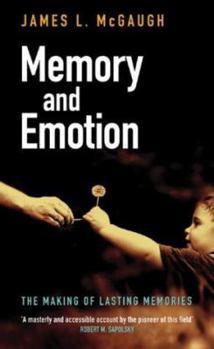Emotion and Memory : The Making of Lasting Memories
Select Format
Select Condition 
Book Overview
Drawing on fascinating research and case studies, James McGaugh, a distinguished neuroscientist, reveals that the key to understanding how memories are created may well be understanding how they are... This description may be from another edition of this product.
Format:Hardcover
Language:English
ISBN:0297645935
ISBN13:9780297645931
Release Date:January 2003
Publisher:Orion Publishing Co
Length:176 Pages
Weight:0.85 lbs.
Dimensions:9.2" x 0.8" x 5.7"
Customer Reviews
1 rating
A Memory Primer
Published by Thriftbooks.com User , 22 years ago
One of the faculties of mind that is extremely puzzling is our capacity to remember. Jane Austen knew this. In _Mansfield Park_, she wrote, "If any one faculty of our nature may be called more wonderful than the rest, I do think it is memory... We are, to be sure, a miracle every way; but our powers of recollecting and of forgetting do seem peculiarly past finding out." Past finding out two hundred years ago, yes, and not nearly fully found out now, but memory is gradually yielding its secrets. James L. McGaugh is the director of the Center for the Neurobiology of Learning and Memory at the University of California, and he has written a primer, _Memory and Emotion: The Making of Lasting Memories_ (Columbia University Press), which is a fine summary of how some of the mysteries of memory are being tackled. He has written "for a general readership" (the book is in the "Maps of the Mind" series), but the subject will be a foreign one for most readers, and there are pithy pages that his general readers may have to struggle through. For the most part, though, McGaugh tells good anecdotes and admirably makes clear some of the most hidden of mental processes, and the explanations help us wonder anew at the remarkable capacities that every one of us takes for granted.It is certainly a field in which people are interested. There are plenty of books with titles like _Boost Your Memory Now_, and the health stores do a fine business in herbal treatments that are supposed to make our memories better, with little evidence they work. There may be drugs that improve specific memories, however, or decrease their consolidation. Much of the research has been done on rats; evolutionarily, their brains wound up much like ours, just smaller and less complex. Rats can be trained to do such memory-requiring tasks as maze-running and then can be fiddled with in ways that humans cannot. Such drugs as strychnine, a central nervous system stimulant, can be given immediately _after_ maze training (that is, after all the learning exercise has been done), and the rats remember better what they learned during the training. Giving the strychnine hours after the training does nothing; the brains must have a consolidation phase during which the memory is laid down. Other experiments show that a drug like propranolol, used to lower blood pressure because it counteracts the body's store of epinephrine (also known as adrenaline), can counteract epinephrine's capacity to help consolidate memories. Giving propranolol after an emotional memory test blocks the enhancement boost that emotion gives to memory. This is not an academic exercise. Emergency room victims of trauma, if given propranolol, are less likely to have symptoms of post-traumatic stress disorder.In such ways is memory yielding its secrets. In his review, McGaugh quite rightly refers to the important work of Susan Loftus that shows that false memories can be implanted, especially in children. If you go t





